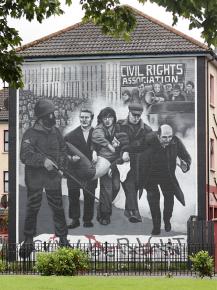It’s time for the truth to be told
As an inquiry into Bloody Sunday--the 1972 attack by British soldiers on protesters in Northern Ireland--prepares to release its findings, the families of those killed are still organizing for justice, writes , a witness to the massacre.
WHY BLOODY Sunday? There have been bigger death tolls. Fifteen Catholics in McGurk's Bar in the New Lodge in Belfast the previous month. Eighteen British Army Paras at Warrenpoint in 1979.
Numbers apart, was not the killing of 11 Protestants as they stood in reverent silence around the Enniskillen war memorial in 1989 every inch as wicked and cruel as the Bogside massacre?
So why the 12-year, $300 million inquiry into Bloody Sunday?
The question is asked and the comparisons cited with new intensity as publication of the report of the Saville Tribunal looms.
One difference about Derry is that, in every other atrocity with which Bloody Sunday is compared, the victims are acknowledged, more or less universally, as having been wrongly done to death, and the perpetrators damned as wrongdoers.
But the Bloody Sunday families were told in their bereavement that while they might personally, understandably lament the loss of a loved one, they had no wider ground for grievance and no legitimate expectation of the killers being punished.

The state stood by its own, and the Bloody Sunday dead were thereby diminished. Liam Wray, brother of Jim (22), shot in the back at point-blank range as he lay wounded in Glenfada Park, commented: "To say that Bloody Sunday wasn't murder was to say that my brother was less than fully human."
The fact that this second injustice had been inflicted by the official custodian of constitutional truth, Lord Chief Justice Widgery, drove the insult deep.
Bloody Sunday, moreover, to an extent that isn't true of other atrocities which litter our past, proved a pivotal plot-point in the narrative of our political history.
Generally, the sharing of heartache in the wake of mass killings has tended to dissipate over time--the lives of the families left behind likely shattered forever, but public life not discernibly changed.
But the Paras' action in Derry catapulted the Bogside and other Catholic-nationalist districts across the North outside all notions of constitutionality, with dramatic effect on the trajectory of events. The Stormont parliament, established with partition in 1921, was abolished by a stroke of the pen of Westminster authority eight weeks later.
No other constitutional development of the last 40 years stemmed so directly from a single incident. This gave Bloody Sunday a lasting significance to match its magnitude as a human event and gave the families' campaign for the truth a lingering capacity to reverberate in the wider world.
BLOODY SUNDAY differed from other atrocities, too, in that it happened in broad daylight in full public view.
Most killings in the North, as always in conflicts of the kind, happen with thunderclap suddenness, on lonely roads or in the dead of night, by stealthy ambush or furtive bomb. But Bloody Sunday unfolded over a period of perhaps a quarter of an hour in a built-up area on a bright, winter afternoon, and in circumstances in which thousands of the victims' friends and neighbors were crowded into the immediate vicinity. Every killing and wounding was witnessed, some at very close quarters.
Within hours, even as the smoke cleared, people in Derry were piecing their memories of the day together and assembling their unshakable truth.
There were few local people who didn't know one or more of the families of the dead. Bloody Sunday had the character not merely of a state atrocity, but of one that inflicted shared injury and a sense of deep, outraged bereavement on a close-knit community. No community thus marked could consign the experience unassuaged to the past.
This was crucial in ensuring that Lord Saville, the chairman of the Bloody Sunday inquiry, would have to hear hundreds rather than scores of Derry witnesses, and therefore a commensurate muster from the military, hugely extending the time scale of the hearings and setting the taxi meters of the legal teams a-whirring for years.
It was the brazenness of the atrocity, more than any other single factor, which dictated the length and the cost of the inquiry.
It shouldn't need repeating, but will over the coming days, that Bloody Sunday was not an assault by elements of one community upon another. It does not fit into the narrative preferred by the British government and now is seemingly accepted by all mainstream parties.
This was a massacre of citizens by the state. When such happens, it is in the interest of all that the state be held to account. Protestant people should resist pressure--coming particularly from the Democratic Unionist Party--to see acknowledgement of the truth of Bloody Sunday as a concession to Catholics, a bitter pill to be swallowed with distaste and resentment, if at all.
The most insidious complaint about Saville has been that the enterprise was always certain to prove futile because "people have already made their minds up."
Many have. The families and their supporters who marched, argued and pamphleteered for almost 40 years, weren't insisting on a new inquiry because they wanted to be told the truth, but because they wanted the truth to be told. They didn't need a report from Lord Saville to find out what happened, but to find out whether the state would acknowledge what happened.
The fact that lies had been substituted for a known truth doesn't make the search for acknowledgement of the truth futile, but rather lends it urgency and strength.
Any day now, we may hope, the truth of Bloody Sunday will be acknowledged at last.
First published in the Belfast Telegraph.


